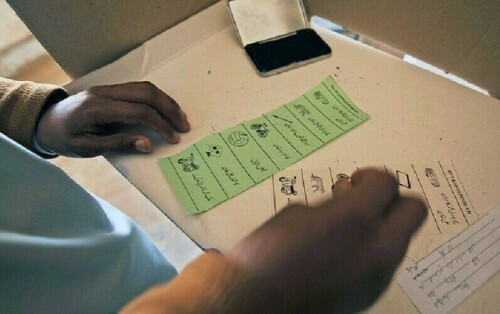IF you were contesting the general elections, what would your symbol be? A laptop, a tennis racket, or even traffic lights? These are quite run-of-the-mill symbols, and are among those that have been allocated to parties and independents participating in the upcoming elections.
But if it were up to the Election Commission of Pakistan (ECP), you could find yourself having to place the mark of the familiar nine-segmented stamp on something like a gravestone, an eggplant (brinjal), or even a donkey cart on polling day.
These, and more similarly weird icons, are all part of the ECP’s official list of symbols which it allocates to political candidates ahead of the elections.
According to the ECP’s list, 150 symbols have been allocated to political parties, and 174 were available for the independent candidates to choose from for the Feb 8 elections.
In addition to the ones mentioned above, the latter category include shoes, wash basin, tongs, cage, nail cutter, mobile phone charger, SIM card, screw, spoon, tawa, shuttlecock, etc.
Candidates are ticked off by inappropriate items such as ‘gravestone’, ‘spoon’, ‘donkey cart’ or ‘eggplant’ on ECP’s official list, but no one has done anything about it
While these may be run-of-the-mill items that we use every day, the connotations of these symbols often belie a different, more subversive meaning.
For example, allocating a kitchen-based item — such as a ‘frying pan’ or ‘tawa’ — to a woman candidate could have chauvinistic undertones. Similarly, any politician being allocated the ‘spoon’ could come to be derided for being obsequious, as that is the cultural connotation associated with that particular piece of cutlery.
So why does the ECP have such problematic symbols, and why don’t political parties, who have raised the issue of ‘objectionable’ or ‘problematic’ symbols in the past, not take any action to do away with such icons?
How items make it to ECP’s list of symbols
An ECP spokesperson told Dawn the allotment of symbols was carried out under Section 67 of the Elections Act, 2017, which was amended in 2023.
The section empowers returning officers (ROs) to allot “one of the prescribed symbols” to contest candidates.
Section 67(2) states that a party’s candidate will get the symbol of that party, but under Section 67(3), an independent candidate will choose a symbol not allocated to any political party.
Under Section 67(2)(a), a symbol chosen by one independent candidate will not be allotted to another candidate. As per Section 67(4), no symbol other than the one prescribed by the ECP will be allotted to any candidate.
While it is not clear exactly how the ECP comes up new items to add to its ever-growing list of electoral icons, ostensibly it is the job of someone in the commission to identify things that can be used on the ballot paper.
A few years ago, the ‘gravestone’ was also part of the list of election symbols, but was omitted from the ECP’s list this time around, apparently due to objections being raised.
Placing the onus on parliament, the ECP spokesperson said that the symbols are placed before the parliamentary committee on electoral reforms for approval before being added to the commission’s list.
As per the procedure, candidates are at liberty to choose any symbol from the ECP’s predetermined list. But, in some cases, these symbols are allotted to contestants against their will by ROs.
In the run-up to the upcoming elections, several candidates — especially those from the Pakistan Tehreek-i-Insaf and the Pakistan Peoples Party — raised a hullaballoo over being allocated irrelevant symbols by the ROs.
But the ECP spokesman told Dawn that after receiving complaints over the allotment of symbols, the relevant ROs were directed to change them.
In some cases, there are also issues with voters’ ability to recognise the correct symbol. For example, the shape of the ‘racket’ symbol is almost identical to the ‘magnifying glass’ symbol, and any reasonable person could get confused between the two if they were featured on the same ballot.
Why parties don’t do anything about it
Since the symbols are approved by a parliamentary committee, which has representation from most parties that are to be involved in the next general election, the question of why these parties don’t do anything about the issue arises here.
Representatives of mainstream political parties that Dawn spoke to agreed that symbols that invoked a double entendre, or were offensive in the local cultural context, should be done away with.
PML-N Senator Irfan Siddiqui said it was the duty of both the ECP and political parties to avoid the allotment of obnoxious election symbols.
Independent candidates, he said, should have a right to choose their election symbols, and if this wasn’t possible, at least “disparaging and humiliating” symbols shouldn’t be allotted to them.
The senator expressed the resolve to tackle the issue if his party comes to power as part of the next parliament. “If we come into power after winning the Feb 8 elections, we will get derogatory symbols removed from the ECP’s list,” he said.
Meanwhile, veteran PPP leader Farhatullah Babar placed the onus on the ECP, saying they should be careful while allotting election symbols and not allot those that could prove to be ‘insulting’ or ‘demeaning’.
He conceded that while the issue became a talking point ahead of polls, no political party paid much attention to the issue after coming into power.
PTI Information Secretary Raoof Hasan claimed that this time around, PTI candidates had been allotted some of the despicable symbols. He was also of the opinion that such ‘double-edged’ symbols should not be allotted to any party or candidate, adding that the PTI would definitely raise the issue in the next parliament.
Published in Dawn, February 5th, 2024















































Dear visitor, the comments section is undergoing an overhaul and will return soon.